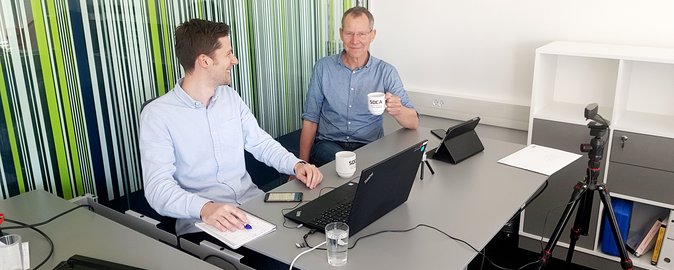- Education
-
Research
Current research
Talent
-
Collaboration
Businesses
Government agencies and institutions
Alumni
-
About AU
Organisation
Job at AU
Journal clubs at Health come in many shapes and sizes. But they all share one thing – they give you the chance of in-depth and detailed discussion with a room full of peers.
2021.03.10 |

Senior data scientist Adam Hulman (left) and clinical professor Per Løgstrup Poulsen act as chairmen and lead a virtual journal club at Steno Diabetes Center Aarhus. Photo: Private
Why make do with reading an article from a researcher abroad when the author can present it themselves – virtually? At the Steno Diabetes Center Aarhus, a monthly journal club attracts participants from the USA, UK, Australia and elsewhere around the globe. And that is just one example of the many different journal clubs affiliated with Health – clubs of varying size, format and composition.
Dean Lars Bo Nielsen appeals to the faculty's employees to find a forum with like-minded people:
"We expect all PhD students at Health to participate in a journal club, but I recommend researchers at all levels to do the same. These are many exciting opportunities for important discussions and for broadening our academic horizons," he says.
Meet three very different journal clubs below:

Niels Jessen – professor of clinical pharmacology at the Department of Biomedicine and head of research at the Steno Diabetes Center Aarhus:
"At the Steno Diabetes Center, we’ve made use of the virtual explosion that has happened during the corona lockdown to start a global journal club. We wanted to continue our series of meetings during the first lockdown, so one of our researchers had the foresight to hurry over to the electronics store and buy some webcams. When we announced the virtual journal clubs on LinkedIn and Twitter, we thought we’d be talking to an internal audience, but researchers from all over the world asked if they could take part. Many of them wanted to tell us about their research, which surprised us.
So now we hold monthly global journal clubs on a Thursday and call it ‘Steno Thursday Global’.
The most recent was about pregnancy and diabetes, and we discussed an article presented by the author who was in Boston, USA: Patrick Catalano, professor and vice chair of obstetrics & gynecology at Tufts University School of Medicine. We actively advertise the meetings, and Twitter in particular brings us into contact with the big wide world. Talented researchers from places such as the UK, Australia and different parts of the United States have taken part and many have themselves approached us and asked if they could present their work.
It’s been hugely beneficial to suddenly be in direct dialogue with foreign researchers. It gives you an unmistakable sense of being part of an international research environment. People in other time zones have been very flexible. They’ve also been affected by a lockdown, so perhaps they just do their presentation at home in their bedroom. The meetings take an hour, and we’ve had as many as a hundred participants, which has put our Zoom subscription under pressure.
Our global journal club is definitely here to stay. We’re thankful to one of our researchers – Adam Hulman. He was the one who insisted that it was even more important than usual for us to hold our meetings during lockdown and made a hurried trip to the electronics store. He has been passionate about it from the start – and we’ve seen the light afterwards."
Read more: https://www.stenoaarhus.dk/research/steno-thursdays-global/

"Normally, journal clubs are for members of academic staff. However, we’re only three academic staff in the Section for Prosthetic Dentistry – but on the other hand, we have many clinical dentists. They’ve been invited to join our journal club to give them more of a sense of affiliation with the university and to expand their academic horizons.
Our journal club is held on Zoom on the last Thursday of the month between 20:00 - 21:00, because both I and the two postdocs have small children who need to be put to bed first. The participating dentists are also busy at the clinic during the daytime, and many are at the dental surgery after work at the School of Dentistry. But they’re happy to participate in our journal club, and I think it's because it reminds them to think scientifically and to be critical. Our world is characterised by dental companies that are constantly trying to promote products in a market where there is always something new, and it’s important to maintain a critical approach.
When we meet, dentists from private surgeries who also teach here at the clinic get a closer connection to the university and access to knowledge about the latest research which they wouldn’t otherwise familiarise themselves with. For example, in April we’ll have a presentation by one of our Honorary Skou Professors at the department, Professor, DMSc. Irena Sailer from the University of Geneva.
We invite around forty people, and as a rule there’s usually good attendance. I find the scientific articles we discuss with the help of our two postdocs. It's a slightly different journal club, because we're not so focused on the scientific methodology. What we’ve said to the participants is that we’ll assess the scientific quality and instead spend time discussing results. The dentists are good at telling us what they want to hear about, and when it’s relevant we connect this to our own research, so they get an insight into what we work with at the section. We try to keep the topics and the conversation clinically relevant so that the participants can use the new knowledge in practice. I think some of them even have those eureka moments.
Our postdocs make a PowerPoint and spend the first 15-20 minutes of the meeting going over the article. Then there is forty minutes for discussion. Last time, we sent a questionnaire in advance about different types of acid etching bridges. We asked about which types and methods the participants used in their dental surgery, and then we compared the replies to the research article on the topic. That’s a good way to kick-start the discussion."

"Our journal club is about muscle physiology. We discuss interesting science within our subject area on the background of scientific articles that we take turns choosing.
We’re typically between five and 15 participants, and I like the fact we’re not too many and can have a discussion. Our journal club is mostly centred around PhD students, but can also include students doing their thesis who are in the laboratory, project employees or tenured researchers. Everyone participates on an equal footing.
And receives the article a week or two before the meeting. We always begin with a short presentation, and then we get into the meat of the article and discuss all of the aspects that we find exciting. We’re typically interested in the article because it uses methods we’d be interested in using, or because it demonstrates results that have perspectives in relation to our own projects.
Being able to take an in-depth look at research results within my field is really good. It’s a chance to dig into the small details which can be difficult to do when teaching larger classes. You can really be nerdy. It's exciting to meet, but I'm also aware that it's an activity that is part of the education we give our students. As a researcher, you always need to be able to review other people's research, and that’s very much what we do here. So in this way it’s training for the participants.
Originally, we had a journal club once a month, but during the lockdown we’ve increased the frequency because we can’t use the laboratory. So now we meet on Zoom either weekly or fortnightly. It’s primarily an academic event, but we usually have cake and tea when we meet in person, so here during the lockdown I think the social aspect is probably even more in focus. You suddenly find yourself missing having people to talk to, so although it’s an academic discussion, it also has a social aspect."
Contact your immediate supervisor if you want to participate in, or get more information about, a journal club - or find the Journal Club-database here.